
The year is 2025, and Hollywood is collectively scratching its head, or perhaps, in some backrooms, experiencing a quiet, existential dread. For months, the trade papers have been buzzing, then shouting, about an anomaly so profound it threatens to rewrite the very grammar of global cinema. The highest-grossing film of the year, a film that has almost unseated James Cameron’s behemoth, Titanic, from its decades-long, seemingly insurmountable perch, is not Marvel’s Cosmic Clash Part 7, nor Fast & Furious 28: Hyper-Jump, nor even a star-studded musical adaptation of a beloved classic.
No, the film is The Whispering Stone.
It’s an unassuming title for an unassuming film. Directed by a first-time Icelandic-Japanese filmmaker named Elara Sæmundsdóttir, and starring a cast of largely unknown, septuagenarian non-actors, The Whispering Stone is a quiet, contemplative drama set in a remote, windswept village on the coast of the Faroe Islands. Its premise is deceptively simple: an aging fisherman, grappling with the loss of his wife and the fading of his community's ancient traditions, discovers a smooth, enigmatic stone on the beach that seems to hum with the collective memories of the island. He begins to carve symbols into it, not with any particular purpose, but out of a deep, inarticulate need to connect with something enduring. The film unfolds over a year, tracking the changing seasons, the ebb and flow of the tides, and the subtle, almost imperceptible shifts in the man’s quiet world. There are no explosions, no CGI spectacles, no intricate plot twists. Just the raw, beautiful vastness of nature, the lines on an old man’s face, and the profound, silent poetry of human resilience.
When The Whispering Stone first premiered at the Sundance Film Festival in January, it was met with polite applause and a few glowing reviews from indie critics who praised its "unflinching authenticity" and "meditative beauty." It was picked up by a boutique distributor for a modest sum, with plans for a limited arthouse release in major cities. Industry insiders predicted a respectable critical run, perhaps a nomination or two during awards season, and a global box office haul in the low millions – a success for a film of its kind, certainly, but utterly negligible in the shadow of the tentpoles.
But then, something inexplicable happened. The whispers began. Not paid marketing whispers, but genuine, heartfelt testimonials. A TikTok user, an aspiring filmmaker with a small but dedicated following, posted a tearful, unscripted review, confessing how the film had "unlocked something forgotten" within her. Another, a travel influencer, shared breathtaking stills from the film juxtaposed with her own serene travelogue, emphasizing the quietness and beauty The Whispering Stone celebrated. Online forums, usually dedicated to dissecting superhero lore or speculating about franchise reboots, found themselves awash with discussions about the film's profound emotional impact. "It's like therapy," one user wrote. "I didn't realize how much I needed to slow down until I watched this."
The limited release expanded, then exploded. The quiet hum grew into a roar. The Whispering Stone became a cultural phenomenon, propelled entirely by word-of-mouth and genuine, unadulterated emotional resonance. People weren't just watching it; they were experiencing it. They were bringing their friends, their families. They were seeing it multiple times. In an age of digital fatigue and relentless stimulation, the film offered a balm – a cinematic antidote to the noise, a deep breath in a world gasping for air. Its themes of connection to nature, the value of tradition, the quiet dignity of old age, and the search for meaning in simplicity, resonated universally, cutting across demographics and cultural divides. Dubbed in dozens of languages, screened in every corner of the globe, from multiplexes in Shanghai to pop-up cinemas in remote Patagonian towns, The Whispering Stone transcended its humble origins.
The studio executives, who had initially dismissed it, now frantically analyzed the data. The numbers were unprecedented. The film was selling out theaters on repeat viewings. Its per-screen average was astronomical. It bypassed every major blockbuster of the year, then last year’s, then the decade’s. Slowly, surely, it crept up the all-time list, closing in on the mythical territory once solely inhabited by Avatar and, more iconically, Titanic. Every news cycle became a countdown: "Can The Whispering Stone do it?" The idea of a film with no stars, no special effects, no pre-existing IP, reaching such dizzying heights was not just improbable; it was revolutionary.
As 2025 draws to a close, The Whispering Stone sits just millions shy of Titanic's gigantic record. It hasn't quite broken it, but its proximity is the louder statement. Its legacy isn’t just about the money, though that figure is staggering. It’s about the profound re-calibration of what constitutes success in an increasingly fragmented entertainment landscape. It's a testament to the enduring power of quiet storytelling, to the collective human yearning for authenticity, and to the unpredictable magic that happens when a film, against all odds, truly, deeply, whispers to the soul of the world. Hollywood, for once, has been outmaneuvered not by a bigger budget, but by a deeper truth. And in that, perhaps, lies its most significant revolution yet.